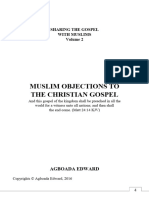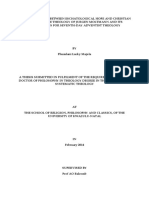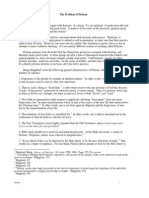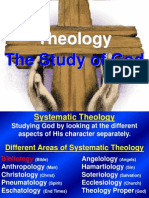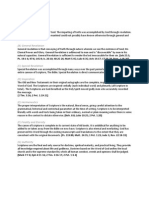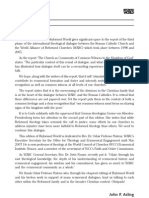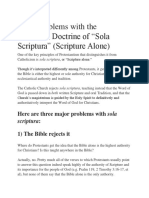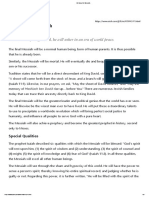Assignment 1
Assignment 1
Uploaded by
Elijah Tafadzwa MatimbaCopyright:
Available Formats
Assignment 1
Assignment 1
Uploaded by
Elijah Tafadzwa MatimbaCopyright
Available Formats
Share this document
Did you find this document useful?
Is this content inappropriate?
Copyright:
Available Formats
Assignment 1
Assignment 1
Uploaded by
Elijah Tafadzwa MatimbaCopyright:
Available Formats
Christian theology is a discipline in religious thought that is restricted in its narrower sense, because of its origination in and format
to Christianity. According to McGrath (1994), it is defined as talking about God in a Christian way. It is the intellectual reflection of the act, content and implications of the Christian faith. According to Clarke (1971), Christian theology professes belief in Jesus as Christ and is a religion that is based on the life and teachings of Jesus. The writer of this paper will discuss some of the sources of Christian theology, outlining some of the limitations of each source. According to Macquarrie (1967), these sources are also referred to as the formative factors of Christian theology. The writer has identified five major sources, namely scripture, tradition, revelation, reason and experience and these will be discussed in detail. However it must be noted that all these sources are very much related and one builds its basis on another, therefore it may not be easy to discuss them separately without reference to the other. Scripture is the universally acknowledged source of Christian theology within the Christian church. According to McGrath (1995), the bible is a collection of books which Christians regard as authoritative in matters of thought and life. He further argues that bible and Scripture both refer to a body of texts which are recognised as authoritative for Christian thinking. Hall (1975), argues that, so long as a community designates itself Christian, it is beholden to the scriptural testimony of the foundational events which establish the fundamental character of Christian belief. The canon and scripture of the Christian church include both the Old Testament and the New Testament, of which the Old Testament establishes the totality of context within which the meaning of Christs life, death and resurrection are to be interpreted. The New Testament is believed to give practical guidelines on how to live the Christian life. According to McGrath (1994), questions on Christian theology relates to the authority and interpretation of the scriptures. It is argued that scriptures are open to a series of
interpretations, some of which were not even remotely Christian. According to McGrath (1995), the Gnostic controversies of the second century had the Gnostic writers putting forward some speculative interpretation of the scriptures. In response to this, some scholars such as Iraneaus emphasized the need to interpret the scripture in line with the living tradition of the church. According to McGrath (1994), during canonisation rules were set on which texts could be regarded as scriptural and authoritative for Christian theology. Comparison of the contents of the Old Testament in the Hebrew version on one hand and the Greek and latin version on the other show that the later contained a number of words absent in the former and thus intensifying the debate on the authenticity of the scriptures. The status of a further group of texts referred to as the apocryphal has been a subject of debate between the Roman Catholic and the Protestants. In spite of all this, Christian Theology asserts that because the Bible is inspired by God, it is therefore trustworthy and reliable as the churchs text. The bible is scripture meant to be read, understood and applied in a way that differs from merely human text. This brings us to another source of Christian theology called tradition. Macquarrie (1967), defines tradition as an active process of reflection by which spiritual insights are valued, assessed and transmitted from one generation to another. Tradition was also viewed as the traditional way of interpreting scripture. According to Mcgrath(1995), Irenaeus insists that the Christian community possessed a tradition of interpreting scripture which was denied to the heretics. This he argues ensured that Christians remained faithful to the apostolic witness in the face of non Christian interpretation of the scriptures. Tradition is then seen as offering both stability to the teaching of the church and defence against Gnostic positions. The mainstream reformation adopted this approach insisting that traditional ways of interpreting scripture such as the doctrine of infant baptism and trinity could be retained, so long as they show consistence with scripture. It was argued that scripture is silent on a number of points
which would then be revealed in unwritten tradition. This meant that a belief not found in scripture could be justified by an appeal to an unwritten tradition. Scripture and tradition are coherent. McGrath (1994), maintains tradition as the corporate historical reflection upon scripture. However, it has to be read critically taking due consideration to its historical, philosophical and cultural context. Some radical theologians argue that respect for tradition was seen as capitulation to the authority of the past, a self imposed bondage to outdated social, political and religious structures. Clarke(1971) puts forward revelations as the chief source of Christian theology. According to Migloire (1991), revelation is the disclosure of the character and purpose of God and when it is revealed it radically changes the lives of its recipients, for instance Paul experienced the revelation of Jesus Christ that he turned from a persecutor of the church to a an apostle of Jesus Christ (Galatians 1 verse 12). The Christian faith is not only about a mans search for God but also Gods will to reveal himself to man. God reveals himself to man through his word. According to Clarke (1971), Gods self revelation was made in life and action. When God showed himself to Abraham it was in what he did to the man who trusted in him that God became known for what he was. Revelation of God to Israel through Moses was in small part by speech but mainly by action. Prophets though they spoke of him, from him, but also pointed to him as a God manifest in his doings. God also revealed himself to man through Christ. For God to thoroughly reveal himself and his character to men, he had to come within the range of mens personal knowledge, live a life among men in which they might see him as he is. Paul says it pleased God to reveal his Son in me, (Galatians 1 verse 6). According to McGrath (1994), God has revealed himself to mankind through nature which bore witness to God. However this knowledge of God is to be supplemented by revelation, which gives information which is not otherwise available.
Migliore (1991), argues that the problem with revelation as a source of Christian theology is that it offers a glimpse of the very heart of the mystery. Revealed knowledge is resisted because it is so frightening and threatening. It compels momentous decisions about who god is and how we are to understand the world and ourselves. Some theologians content that the concept of revelation is quite peripheral in the bible. It tends to focus on the sorts of epistemological questions that are prominent in modern philosophy and science rather than the question of salvation. Concentrating on revelation then would mean the human predicament is ignorance rather than sin yet in the bible people do not ask, what must l know? but who must l be and what must l do to be saved. (Mark 10 verse 17 and John 3 verse 3). According to Clarke (1971), the way God reveals himself to man and mans self revelation about God is grounded in experience. It is defined as the life, individual or collective, that consists of fellowship with God as Christ reveals Him and in the fruits of that fellowship. Christian experience is the channel through which revelation comes. Clarke (1971) goes on to state that experience is the mediator between Christian theology and its source - revelation. The theology of an individual receives much from his/her personal Christian experience and the theology of any age is largely an expression of the Christian experience of that age. Experience which resources theology is of many kinds. It includes the cultural matrix in which one lives which supplies one with the language, symbols, myths and outlooks of the world. Experience shape the way one thinks, influences the way one read scriptures and has got a direct bearing on which traditions of the church one would find helpful as a source of our theologising. For some theologians experience is a field of revelation not a source of theology. It is taken as the medium through which other sources of theology speak to us, or an interpretive framework, but not its foundational resource. This view is supported by a growing consensus
that there are no pure experiences. One scholar Stanley Grenz draws the conclusion that a valid theological proposal may contradict previous experiences, transform present experience and facilitate future experiences. Martin Luther demonstrates the unreliability of human experience by pointing to the disciples experience and even Jesus experience of the absence of God at the cross, yet the resurrection demonstrated that God was present all along. The resurrection was therefore the necessary objective critique of their subjective experience. Summing up then it will mean that nothing can be an authority without being experienced, but experience is not the authority. The last source of Christian theology is reason. Theology involves thinking therefore it draws from the faculties of reasoning. Philosophy is a useful tool for articulating and structuring theology. Theology should call on critical reasoning for disciplined argument as this maintains logical coherence and critiques other points of view. According to McGrath (1994), human beings are rational beings. Reason is seen as a subservient to revelation. It allows us to reflect on revelation. Aquinas argues that faith goes beyond reason, having access to truths and insights of revelation which reason cannot discover. Reason builds upon what is known by revelation, thus exploring what its implications might be, so theology is a rational discipline. It should then be noted that none of the sources of Christian theology is independent from another but one builds on the other and finds its strengths and relevance on another. For it to be Christian theology, its continuity with Christianitys historical roots must be preserved, especially the founding revelation of God in Christ as witnessed to and interpreted in the scriptures. Due respect must be paid to traditional interpretations and formulations handed from the past. Experience and reason are considered as theological tasks from the present whereas scripture and tradition as from the past. In as much as revelation was coming from scripture, both cannot be divorced from tradition. It is therefore impossible to separate one
from another. Scripture resulted from reasoned understandings of things revealed to man by God. Experience recorded from pre-existent traditions that developed by interpreting previous events.
Bibliography Clarke W.N (1971), An outline of Christian Theology, Scribner Press, New York Macquarrie J (1967), God Talk: An Examination of the Language and Logic of Theology, SCM Press, New York McGrath A.E (1994), Christian Theology: An Introduction, Blackwell Publishers, New York. McGrath A.E (1995), The Christian Theology Reader, Blackwell Publishers, New York Migliore D.C (1991), Faith Seeking Understanding: An Introduction to Christian Theology, Wm.B.Eerdmans Publishing Company, Cambridge
www.theology.udu www.scott.brisbane.id.au/theology/sources/ www.freedictionary.com/christian www.blackwellpublishing.com/mcgrath www.revandylittle.com/doing-theology-praxis/sources www.ezinearticles.com/?sources
You might also like
- Thesis Proposal v.3Document8 pagesThesis Proposal v.3Chad BrooksNo ratings yet
- God The SonDocument38 pagesGod The SonRecuperatedbyJesusNo ratings yet
- An Essay On Luke's Missionary ModelDocument18 pagesAn Essay On Luke's Missionary ModelTesfaye Endale ChencheloNo ratings yet
- Review On The Various Perspectives of Christ and CultureDocument15 pagesReview On The Various Perspectives of Christ and CultureTesfaye Endale ChencheloNo ratings yet
- Why Is "Being Religious Interreligiously" Imperative For Us Today?Document1 pageWhy Is "Being Religious Interreligiously" Imperative For Us Today?Lex HenonNo ratings yet
- Soteriology - Monergistic or Synergistic?Document13 pagesSoteriology - Monergistic or Synergistic?Peter Richardson100% (1)
- Sharing The Gospel With Muslims Vol 2Document111 pagesSharing The Gospel With Muslims Vol 2Agboada EdwardsNo ratings yet
- The Study of Order of Salvation - Final Papers in Theology IIIDocument17 pagesThe Study of Order of Salvation - Final Papers in Theology IIIREYDENTOR PANGANIBAN JRNo ratings yet
- Hardwick - 23458229 Research THEO 530Document23 pagesHardwick - 23458229 Research THEO 530Clay HardwickNo ratings yet
- Harvest Thanksgiving 2021Document3 pagesHarvest Thanksgiving 2021andrew_mcdonald_82No ratings yet
- The Christian Doctrine of SalvationDocument15 pagesThe Christian Doctrine of SalvationAlingal CmrmNo ratings yet
- Definitions of The Kingdom of GodDocument2 pagesDefinitions of The Kingdom of GodRAYMUNDO RAMOSNo ratings yet
- Method in Dogmatic Theology: Protology (First Revelatory Mystery at Creation) To Eschatology (Last RedemptiveDocument62 pagesMethod in Dogmatic Theology: Protology (First Revelatory Mystery at Creation) To Eschatology (Last RedemptiveefrataNo ratings yet
- CatechismDocument56 pagesCatechismJonathan Yetu YisaNo ratings yet
- Discipleship Transforming The World: Wedad A. TawfikDocument12 pagesDiscipleship Transforming The World: Wedad A. TawfikKarim Atef GuirguisNo ratings yet
- New Developments in The Theology of Sacrifice: Scholarly UpdateDocument10 pagesNew Developments in The Theology of Sacrifice: Scholarly UpdatefreddawesNo ratings yet
- PHD Thesis PL MajolaDocument250 pagesPHD Thesis PL Majolaapi-498406463No ratings yet
- The Problem of PietismDocument4 pagesThe Problem of PietismSteve BornNo ratings yet
- Mystery of The Trinity - Peter J. Leithart - First ThingsDocument4 pagesMystery of The Trinity - Peter J. Leithart - First ThingsDomingo Martínez RippesNo ratings yet
- Historical Foundations of ChristianityDocument42 pagesHistorical Foundations of ChristianityKendi Kejar IralNo ratings yet
- The Church in The Patristic EraDocument1 pageThe Church in The Patristic ErabingyamiracleNo ratings yet
- Basic Theology Biblio LogyDocument16 pagesBasic Theology Biblio LogyFrans N PandjaitanNo ratings yet
- 2 - About Christians PersecutionDocument4 pages2 - About Christians PersecutionBible_lover_BillNo ratings yet
- Hebrew Roots MovementDocument2 pagesHebrew Roots MovementYahaira Cabrera100% (2)
- Old Testament Survey - Yot 2015 UpdatedDocument57 pagesOld Testament Survey - Yot 2015 UpdatedBrett DolleryNo ratings yet
- The Pentecostal Ethic and The Spirit of Development - Dena FreemanDocument54 pagesThe Pentecostal Ethic and The Spirit of Development - Dena FreemanCleonardo Mauricio JuniorNo ratings yet
- Death, Burial, Resurrection: Transformed into His LikenessFrom EverandDeath, Burial, Resurrection: Transformed into His LikenessNo ratings yet
- Pneumatology - Term Paper 1Document11 pagesPneumatology - Term Paper 1Moses OminoNo ratings yet
- (A) Revelation: SECTION 1-BibliologyDocument15 pages(A) Revelation: SECTION 1-BibliologyBrandon CarmichaelNo ratings yet
- Salvation HistoryDocument2 pagesSalvation HistoryErica TañoNo ratings yet
- Baby BaptismDocument5 pagesBaby Baptismacts2and38100% (1)
- Ecclesiology Lecture 1Document22 pagesEcclesiology Lecture 1Alexander Rubio100% (1)
- 501 Where Can We Find The Truth? by Phil SandersDocument3 pages501 Where Can We Find The Truth? by Phil Sandersbright williamsnNo ratings yet
- BibliologyDocument41 pagesBibliologyManny100% (1)
- Reformed World Vol 57 No 2-3 (2007)Document125 pagesReformed World Vol 57 No 2-3 (2007)schreamonn5515No ratings yet
- An Examination of Karl MarxDocument6 pagesAn Examination of Karl MarxNdubuisi EmmanuelNo ratings yet
- Witnessing To Jehovah's WitnessesDocument8 pagesWitnessing To Jehovah's WitnessesMick AlexanderNo ratings yet
- Church History Part 1 and 2 Students Study Guide With QuestionsDocument4 pagesChurch History Part 1 and 2 Students Study Guide With QuestionsrosettablytheNo ratings yet
- Eschatology Part 27: The MillenniumDocument6 pagesEschatology Part 27: The MillenniumGrace Church ModestoNo ratings yet
- Thesis 1: GALLETIS, Razil S. (46 Gen) REVELATION AND FAITH (Dr. Victoria Parco, AY 2013-2014)Document21 pagesThesis 1: GALLETIS, Razil S. (46 Gen) REVELATION AND FAITH (Dr. Victoria Parco, AY 2013-2014)Crisanta MartinezNo ratings yet
- Luther Vs UOJ PDFDocument183 pagesLuther Vs UOJ PDFwienslaw5804No ratings yet
- My Reflections On Vita ConsecrataDocument6 pagesMy Reflections On Vita ConsecrataKim Larson BaltazarNo ratings yet
- God Conceals, God Reveals FullDocument4 pagesGod Conceals, God Reveals Fulljohn_lindsey653No ratings yet
- God'S Wonderful Will For Us To Obey! A. Some Important Questions For Us To ExamineDocument2 pagesGod'S Wonderful Will For Us To Obey! A. Some Important Questions For Us To ExamineAgoraphobic NosebleedNo ratings yet
- CTH 849 - The Rise and Growth of Western Christianity in West Africa PDFDocument185 pagesCTH 849 - The Rise and Growth of Western Christianity in West Africa PDFOshinubi Joshua100% (1)
- 3 Big Problems With The Protestant Doctrine ofDocument3 pages3 Big Problems With The Protestant Doctrine ofJun CabsNo ratings yet
- Understanding The Death of Jesus The Report of The Theological C 1970Document12 pagesUnderstanding The Death of Jesus The Report of The Theological C 1970Rasta 28No ratings yet
- The Second Coming-NotesDocument7 pagesThe Second Coming-Notesmanoj kumarNo ratings yet
- Vengoor, Ayur, Kerala: Ebenezer Theological SeminaryDocument4 pagesVengoor, Ayur, Kerala: Ebenezer Theological SeminaryAnkam ManideepNo ratings yet
- St. Augustine On Mysticism.Document4 pagesSt. Augustine On Mysticism.Antonio NwachukwuNo ratings yet
- False TeachingDocument2 pagesFalse TeachingRODNEY TAN100% (1)
- Christian UnityDocument13 pagesChristian UnitySishaj P SimonNo ratings yet
- 20th Century TheologyDocument3 pages20th Century TheologyLight Learning ClubNo ratings yet
- God's Plan of SalvationDocument8 pagesGod's Plan of Salvationfatherkline100% (2)
- All About The MessiahDocument5 pagesAll About The Messiahdougmungavin3744No ratings yet
- Christological SynthesisDocument3 pagesChristological Synthesisyam yuayanNo ratings yet
- Literature and LoveDocument2 pagesLiterature and Lovefy56srjpzqNo ratings yet
- Bel Canto On The PianoDocument3 pagesBel Canto On The PianoŠašavi Sam Majmun0% (1)
- Evangelization The Modern WorldDocument31 pagesEvangelization The Modern Worldsandip4christ100% (1)
- Kruskal and Wallis 1952Document40 pagesKruskal and Wallis 1952bm1150gsNo ratings yet
- Project-3-Exercises-Unit-5-Third-Edition (WWW - Languagecentre.ir)Document3 pagesProject-3-Exercises-Unit-5-Third-Edition (WWW - Languagecentre.ir)moba.nasirizadeh.1379No ratings yet
- Linking Abaqus 2022 Intelone APIFortran Compiler Visual Studioin Windows 10Document14 pagesLinking Abaqus 2022 Intelone APIFortran Compiler Visual Studioin Windows 10Adnan AhmedNo ratings yet
- CGP Year 3 English WorkoutDocument3 pagesCGP Year 3 English WorkoutnatwestgrpNo ratings yet
- The Past Beneath Our Feet-Sj l3 May 2016Document5 pagesThe Past Beneath Our Feet-Sj l3 May 2016api-325718693No ratings yet
- History of Iligan City: "Industrial City of The South" and "City of Majestic Waterfalls"Document3 pagesHistory of Iligan City: "Industrial City of The South" and "City of Majestic Waterfalls"Melissa Jane Morado100% (1)
- HSE MET Report Template For FHDocument10 pagesHSE MET Report Template For FHluckyrabbit20112015No ratings yet
- The Meridian English ClassesDocument11 pagesThe Meridian English ClassesThe Meridian English ClassNo ratings yet
- Chapter - 4 Pythons Control StatementsDocument37 pagesChapter - 4 Pythons Control StatementspsukeshwarNo ratings yet
- English 8 Q2 WK1Document33 pagesEnglish 8 Q2 WK1RUTH KLARIBELLE VILLACERANNo ratings yet
- AE420 Chpt7 Fall 2021Document20 pagesAE420 Chpt7 Fall 2021LIU HengxuNo ratings yet
- Prova Progressão Parcial 6º Ano 2023Document4 pagesProva Progressão Parcial 6º Ano 2023Phillipe AlcantaraNo ratings yet
- UserDocument150 pagesUserRahul ShardhaNo ratings yet
- Tms 320 F 2808Document146 pagesTms 320 F 2808Bui van DinhNo ratings yet
- Output 15Document910 pagesOutput 15nch84041No ratings yet
- 09 eLMS Review 1 - ARGDocument2 pages09 eLMS Review 1 - ARGEMILY M. RAGASANo ratings yet
- New Count The DotsDocument1 pageNew Count The Dotslin ee100% (1)
- English 4 q2 w3 Day 1-5Document133 pagesEnglish 4 q2 w3 Day 1-5Jessica QuiniaNo ratings yet
- Philosophical Thoughts On EducationDocument97 pagesPhilosophical Thoughts On EducationMary ann GatanNo ratings yet
- F 01 Shalatan - GovernmentDocument140 pagesF 01 Shalatan - GovernmentyadayahNo ratings yet
- Beowulf Values Reflection SheetDocument2 pagesBeowulf Values Reflection Sheetapi-457003323No ratings yet
- Soal Bing KLS 8 SMT 1Document1 pageSoal Bing KLS 8 SMT 1Kaiba Setto100% (4)
- May 19, 2024 - Pentecost SundayDocument4 pagesMay 19, 2024 - Pentecost SundayGerald GajudoNo ratings yet
- List of Textbooks (2018-2019) Name of The School: DAV Public School, Gandhi Nagar - CCL, Kanke Road, Ranchi - 834 008Document1 pageList of Textbooks (2018-2019) Name of The School: DAV Public School, Gandhi Nagar - CCL, Kanke Road, Ranchi - 834 008Suryansh MaheshwariNo ratings yet
- 3 SAT QuestionsDocument3 pages3 SAT Questionswonbinpark7No ratings yet
- CHM131 - Chapter 3 - Chemical BondsDocument87 pagesCHM131 - Chapter 3 - Chemical BondsLeo PietroNo ratings yet
- Artifact Suggestions: Domain 3Document27 pagesArtifact Suggestions: Domain 3orlandoNo ratings yet






